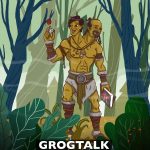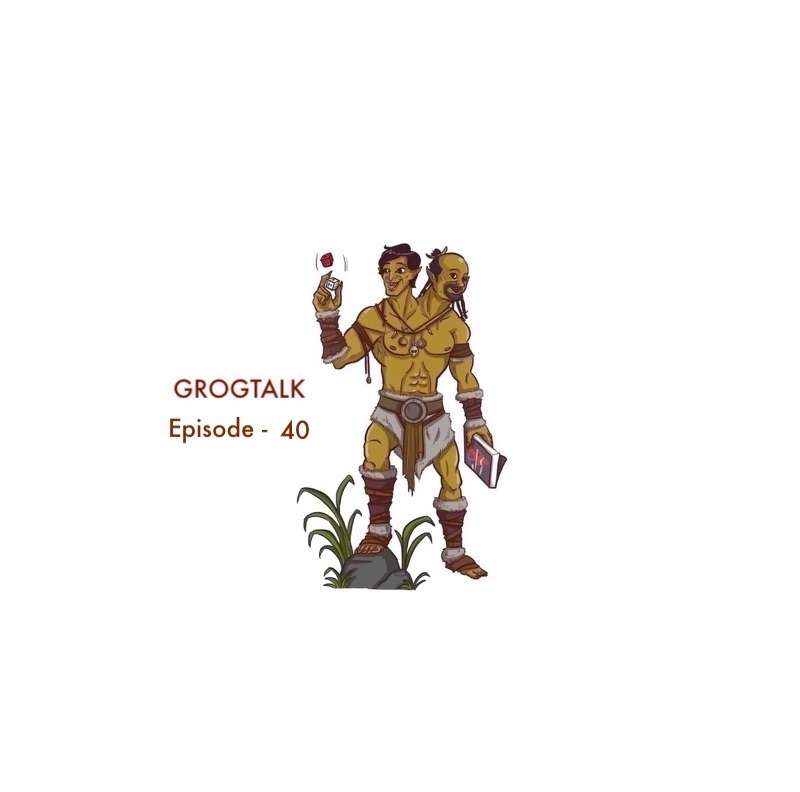
/
RSS Feed
Join Dan and James as they discuss the optional Bard class in Advanced Dungeons & Dragons 1st Edition. This controversial class is both loved and hated due to the triple class and the potential for overpower characters.
GROGTALK posts episodes every week and is available at www.grogcon.com/podcast/ Subscribe via iTunes, Google Play, Spotify, or iHeartRadio or connect to our feed – https://www.grogcon.com/feed/podcast. GROGTALK is on YouTube and on Twitter (@GROGTALK)!!!
Support GROGTALK by becoming a Patron! – https://www.patreon.com/grogtalk
Get exclusive content, behind the screen look at the podcast, and a chance to play with Dan and James!

One reply on “Optional Episode 40 – Playing with Class – Bards in Advanced Dungeons & Dragons 1e”
This wonderful work was from our very own Menion, The Captain His Most Brilliant Sagacity Crown Prince Resolute Scythe of Kansai
As I suspected, many of the bardic colleges are taken from historical Irish classes of bard. Although “bards” were common across the Celtic world, the only detailed historical records we have of bards come from Irish (and to a lesser extent Scottish) sources, not Welsh as Best of Dragon would have us believe. These modern Welsh bards, like the modern druids, are not connected to the historical ones but rather are a reconstruction that began with the Celtic Revival of the latter 1800s (such druids would probably deny this vehemently).
Anyway, here’s my rough pronunciation guide, which may be a little off as I’m not familiar with Old Irish (but do have a rudimentary knowledge of Scottish Gaelic), and some trivia on the historical bards (BTW, “bard”, is of course the Gaelic (Irish, etc.) and the Welsh word for poet).
Fochlucan: foch-loo-kan (“ch” as in the Scottish “loch” or simply a breathed “h” if you can’t manage that; loo rhymes with shoe)
MacFuirmidh: mak-fir-me
Doss: (rhymes with floss)
Canaith: ka-neh (or ka-knee)
Cli: klee (rhymes with tree)
Anstruth: an-stroo (possibly with a sligh “h” breathed after the oo vowel (rhymes with shoe))
Ollamh: o-law (or possibly o-lav)
These aren’t all the correct spellings either, but they seem to be the conventional ones that have come down into English-language records/academia. You’ve probably noticed that the last one isn’t Irish but Latin, but to my knowledge, ollamh would have been the highest degree, and would have been the equivalent of a doctor. Bear in mind that Ireland wasn’t affected by the Dark Age that followed the burning of the Great Library, and that the Druidic order seems to have blended into the early Irish Christianity (the Celtic Church). There is said to have been a university of these holy men, the bards and the lawyers that numbered some 10,000 people, and by the medieval period (when they were being partially colonized by Scandinavians and the Anglo-Normans, Old Irish would boast the greatest body of literature in Western Europe bar Latin. (Writing being a Christian thing, the bards would have probably avoided it.)
One of the jobs of the bard was to spread news and information, and another was to sing the praises of, or lampoon (another Irish word), the great (whichever they deserved).
The bards would travel the Gaelic speaking world (then, most of Ireland, the Isle of Man, and much of Scotland) until the various religious/succession wars and English (later British) government laws restricting/banning the language, music and culture associated with the Gaels (interestingly, the bards and the Celtic clan system survived in Scotland the longest, disappearing only after the Jacobite Rebellions of the early-to-mid-1700s.
Anyway, a bit confusing, but hopefully that explains at little why, in my estimation, the bard is a warrior, a lampooner and rogue, a scholar and more. I understand that they’re a difficult one to run in a normal campaign, but they’d fight right in a campaign that drew on Deities & Demigods (Celtic Mythos), alongside druids and pure fighters.
It’s been a long time since I studied all this at university, so there may be some errors. There’s a wealth of books on the Celts, but much is lost in the mists of time, which is probably what draws people and their imaginations to them!
BTW, The Mabinogion (a collection including the Welsh Mabinogi and other tales) is pronounced “ma-bi-no-gi” (gi as in give), Dan. Now try pronouncing the Irish epic “Tain Bo Cuilgne” with its hero Cu-Chulain”!